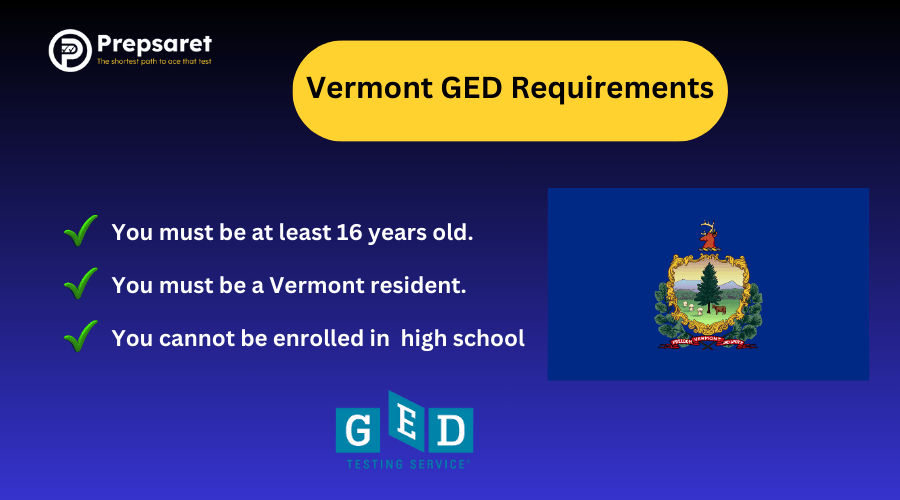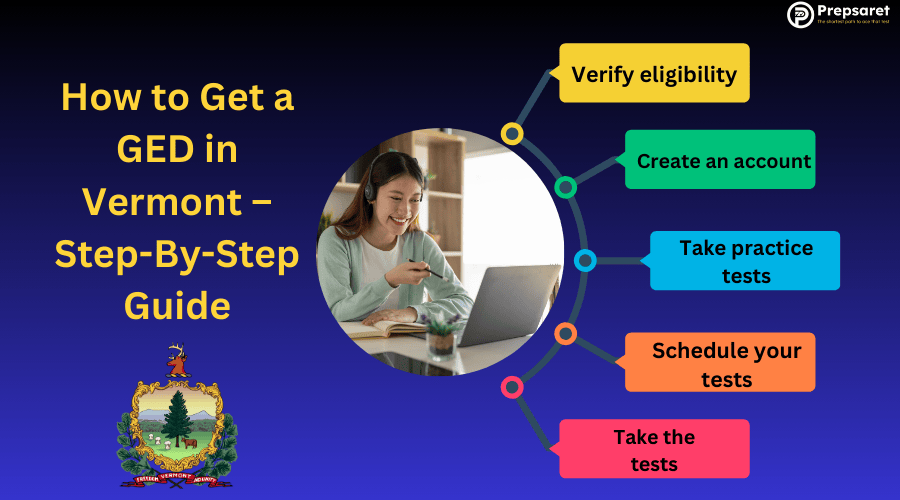Vermont GED Requirements
Obtaining your GED in Vermont is a valuable step toward new educational and career opportunities. Vermont’s GED requirements are accessible, with no residency rule and flexible testing options.
For effective preparation, Prepsaret offers comprehensive study guides, practice materials, and personalized resources to help you succeed. With support from online tools and local adult learning centers, you can confidently work toward this credential.
The Vermont GED demonstrates your dedication and readiness for new possibilities-start your journey today with trusted resources from Prepsaret.
What Are the Vermont GED Requirements?
The Vermont GED Requirements establish who can take the test and under what circumstances. Understanding these requirements is essential before you begin the process.
To qualify for the GED in Vermont, you must meet the following criteria:
- Age: The GED age requirement in Vermont states that you must be at least 16 years old. If you’re between 16 or 17 years old, you’ll need additional documentation.
- Residency: You must be a Vermont resident.
- Educational Status: You cannot be enrolled in an accredited high school or be a high school graduate.
- Pre-testing: Some testing centers may require you to take a practice test before the official exam.
The Vermont Department of Education GED program ensures that these requirements are met before allowing candidates to test. The department works closely with testing centers across the state to maintain consistent standards and provide support to test-takers.
The GED eligibility in Vermont is designed to be inclusive, giving residents who didn’t complete traditional high school a pathway to further education and better employment opportunities.
Related blog post: Rhode Island GED Requirements
Who Can Take the GED? Eligibility & Age Limits
The Vermont GED requirements for adults are straightforward – if you’re 18 or older and not enrolled in high school, you generally qualify to take the test. For younger test-takers, the GED age requirement Vermont includes some additional steps.
If you’re 16 or 17 years old and want to take the GED test in Vermont, you’ll need:
- Written consent from a parent or guardian
- A letter of withdrawal from the last school you attended
- In some cases, approval from your local school district
Vermont Adult Learning offers guidance for younger applicants navigating these requirements. Their counselors can help determine if the GED is the right path or if another option, like the Adult Diploma Program Vermont, might be more suitable.
The Adult Diploma Program Vermont is an alternative to the GED that allows adults to earn a diploma rather than an equivalency certificate.
This program evaluates life experiences and skills alongside academic knowledge, which some adults find better suits their learning style and background.
Cost of GED in Vermont and Available Financial Aid
Understanding the cost of GED in Vermont helps you plan accordingly. As of 2025, the GED test in Vermont costs $144 for the complete battery (all four subjects) or $36 per subject test. This fee structure allows test-takers to pay as they go, taking one subject at a time if needed.
Financial assistance options include:
- Vouchers through local workforce development programs
- Fee waivers through certain adult education programs
- Employer-sponsored testing in some cases
- Veterans’ benefits that may cover testing costs
Many preparation resources won’t cost you anything. A free GED practice test is available through the official GED website ged.com, giving you an accurate assessment of your readiness for the actual exam.
Vermont Adult Learning centers across the state also offer free or low-cost preparation classes and practice tests. These resources are invaluable for those on tight budgets who need to ensure they’re ready before paying for the official test.
Ged Practice & Preparation Options in Vermont
Proper preparation significantly increases your chances of passing the GED test on your first attempt. Taking a GED practice test helps you identify strengths and weaknesses before the official exam.
Preparation resources in Vermont include:
- Free GED practice test options through local learning centers
- In-person classes at community centers and libraries –Vermont Adult Learning
- Online study materials and courses from Prepsaret
- Tutoring services for one-on-one help from.
Vermont Adult Learning operates centers in six regions across the state, offering both in-person and remote preparation options. Their experienced instructors understand the test format and can help you focus on areas where you need the most improvement.
Many successful test-takers recommend a combination of self-study and structured classes. Self-study allows you to work at your own pace, while classes provide accountability and expert guidance.
Most preparation programs will cover:
- Mathematics (algebraic problem-solving, quantitative problem-solving)
- Reasoning Through Language Arts (reading comprehension, writing)
- Science (life science, physical science, earth and space science)
- Social Studies (civics and government, U.S. history, economics, geography)
Read on: How to Prepare for the Ged| K-12 Schools
Taking the GED Online or In-Person in Vermont
Vermont offers flexibility in how you take your GED test. The GED online Vermont option became more widely available after 2020, giving test-takers a convenient alternative to in-person testing.
The online GED test Vermont requirements include:
- A reliable computer with a webcam
- Stable internet connection
- A quiet, private space
- Successful completion of the GED Ready practice test for each subject
- Online proctoring through the official GED testing service
For those who prefer or need in-person testing, several GED testing centers in Vermont are available throughout the state.
Official GED testing centers in Vermont’s major cities:
- Burlington
- Rutland
- Montpelier
- St. Johnsbury
In-person testing centers offer advantages such as:
- Staff assistance with technical issues
- Structured testing environment
- No need for personal computer equipment
- Immediate verification of identity
Whether online or in person, you’ll need to register through the official GED website and schedule your test dates in advance.
Learn more: Best Online Learning Sites in 2025| Free & Paid Platforms
Rules and ID Requirements for Taking the Test
Understanding the Vermont GED testing rules ensures your testing experience goes smoothly. The rules are designed to maintain test security and validity.
Key requirements include:
- Valid, government-issued photo ID (driver’s license, passport, or state ID card)
- Pre-registration through the official GED website
- Arrival at least 15 minutes before your scheduled test time (for in-person testing)
- No personal items in the testing area (including phones, notes, or calculators)
- Adherence to all testing center protocols
The Vermont Department of Education GED program coordinates with testing centers to ensure these rules are consistently applied. Breaking any testing rules can result in your test being invalidated and potential restrictions on future testing opportunities.
Accommodations for Disabilities or Special Needs
For accommodations due to disabilities or special needs, you must request these during the registration process and provide appropriate documentation. Common accommodations include:
- Extended testing time
- Screen readers or other assistive technology
- Private testing rooms
- Breaks as needed
These accommodations must be approved before your test date, so apply for them well in advance.
How to Get a GED in Vermont – Step-By-Step Guide
If you’re wondering exactly how to get a GED in Vermont, follow these steps:
- Verify eligibility: Ensure you meet all Vermont GED Requirements regarding age, residency, and educational status.
- Create an account: Register on the official GED website.
- Take practice tests: Use the official GED Ready practice tests to assess your readiness.
- Prepare for the tests: Use free resources, classes, or self-study materials to strengthen areas where you need improvement.
- Schedule your tests: Book your test dates for each subject through your GED account.
- Pay the fees: Complete payment for each subject test you schedule.
- Take the tests: Complete each subject test, either online or at a testing center.
- Review your scores: Scores are typically available within hours of completing the test.
- Retake if necessary: If you don’t pass a subject, you can schedule a retake (Vermont allows unlimited retakes).
- Receive your credential: After passing all four subjects, you’ll receive your official GED credential.
The process is designed to be flexible, allowing you to take one subject at a time if needed. Most people complete all four subjects within a few months, but you can take as much time as you need.
Vermont Ged Verification and What Happens After You Pass
After successfully meeting the Vermont GED Requirements and passing all four subject tests, you’ll receive your official GED credential. Vermont GED verification is a straightforward process that employers and educational institutions can use to confirm your achievement.
Once You’ve Passed
- Your official credential will be available electronically through your GED account
- You can request official printed credentials for a small fee
- Your achievement is permanently recorded in the GED database
- You can share your results directly with employers or schools through the GED credential service
Many GED Graduates In Vermont Go On To
- Enroll in community college or university programs.
- Apply for jobs requiring a high school diploma or equivalent- for example mail carrier(Bureau of Labor Statistics)
- Qualify for promotions or advancement in their current workplace
- Enter military service
- Pursue vocational training programs, for example, Career and Technical Education
Your GED credential never expires and is recognized nationwide, opening doors to opportunities that might otherwise remain closed.
Many Vermont colleges and universities have specific admissions pathways for GED graduates, and some offer scholarships specifically for those who have completed their high school equivalency.
Vermont Ged Requirements PDF & Helpful Resources
For those who prefer to have official documentation on hand, the Vermont GED requirements PDF is available through the Vermont Agency of Education’s website. This document provides the most up-to-date information directly from regulatory authorities.
Additional resources from the Vermont Department of Education GED program include:
- Testing center locations and contact information
- Accommodation request forms
- Financial assistance information
- Preparation program directories
Local resources that can assist include:
- Public libraries (many offer GED preparation materials)
- Vermont Department of Labor Career Resource Centers
- Community Action agencies, for example, Southeastern Vermont Community Action (serving Windham and Windsor Counties, with some exceptions)
- Adult education programs through local school districts
Remember that requirements and procedures can occasionally change, so checking with official sources for the most current information is always advisable.
Find out: How Can I Get My GED Online for Free?
Vermont Ged Requirements: FAQs
How Much Does a GED Cost in Vermont?
The cost of a GED in Vermont depends on where and how you take the test. Some financial assistance options are available through local education programs, and Vermont Adult Learning may offer free prep and guidance.
Always check the official GED site or the Vermont Department of Education GED page for the most current fee details.
Can I Get My GED Without Taking a Test?
You must take and pass the GED test to earn the credential. The Vermont high school equivalency test is designed to assess your knowledge across four key subjects, and there is no alternative path that allows you to bypass the exam itself.
Whether taken online or in person, completing the test is a required step.
Is a GED Harder Than a High School Diploma?
The GED and a high school diploma both cover similar academic skills, but they serve different paths. Some students find the GED challenging due to the condensed testing format, while others prefer it because it allows for self-paced study.
With the right preparation, like using free GED practice tests or enrolling in the Adult diploma Program, Vermont—many learners succeed.
How to Get a GED Quickly?
If you're looking to earn your GED as efficiently as possible, the first step is to understand the Vermont GED Requirements. Focused studying with a GED practice test, combined with structured support from Vermont Adult Learning, can help you prepare faster.
Choosing the Online GED test Vermont, when available, may also speed up the process by allowing you to test from home.
How Do I Get My Official GED Diploma?
After successfully completing the GED test, you can request your official diploma and transcript through the Vermont Department of Education GED portal or the GED Testing Service website.
This document serves as proof that you’ve passed the Vermont high school equivalency test, and it can be used for employment, college, or training programs.
Vermont GED Requirements
Obtaining your GED in Vermont is a meaningful step that can open doors to further education and better job prospects.
Vermont’s GED requirements are designed to be accessible, even for those who left high school early, and there’s no residency rule or mandatory pre-test (unless testing online).
With preparation, support from adult learning centers, and flexible testing options, you can achieve this important credential. The Vermont GED stands as proof of your determination and readiness for new opportunities-take the first step toward your future today.




